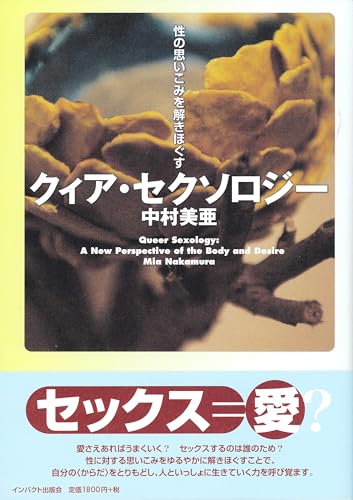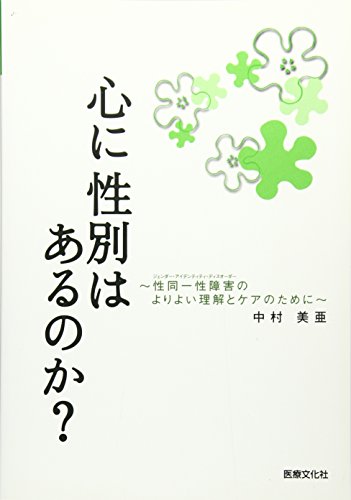20 0 0 0 OA 新しいジェンダー・アイデンティティ理論の構築に向けて―生物・医学とジェンダー学の課題―
- 著者
- 中村 美亜 ナカムラ ミア Mia NAKAMURA
- 雑誌
- Gender and Sexuality : Journal of the Center for Gender Studies, ICU
- 巻号頁・発行日
- no.2, pp.3-24, 2006-12-31
- 著者
- 中村 美亜
- 出版者
- 国際基督教大学
- 雑誌
- Gender and sexuality : journal of Center for Gender Studies, ICU (ISSN:18804764)
- 巻号頁・発行日
- vol.2, pp.3-24, 2006-12-31
11 0 0 0 性のヘルスプロモーション(8)インタビュー 性同一性障害
- 著者
- 中村 美亜 岩室 紳也
- 出版者
- 医学書院
- 雑誌
- 公衆衛生 (ISSN:03685187)
- 巻号頁・発行日
- vol.70, no.6, pp.477-482, 2006-06
- 著者
- 中村 美亜
- 出版者
- 立命館大学国際言語文化研究所
- 雑誌
- 立命館言語文化研究 (ISSN:09157816)
- 巻号頁・発行日
- vol.20, no.1, pp.241-265, 2008-09
10 0 0 0 クィア・セクソロジー : 性の思いこみを解きほぐす
8 0 0 0 ジェンダー・アイデンティティの実りある議論のために (第26回日本性科学会学術集会 ジェンダーとセクシュアリティ) -- (シンポジウム 日本社会におけるジェンダーとセクシュアリティの現状と課題)
- 著者
- 中村 美亜
- 出版者
- 日本性科学会
- 雑誌
- 日本性科学会雑誌 (ISSN:13496654)
- 巻号頁・発行日
- vol.24, no.2, pp.154-157, 2006-10
- 著者
- 中村 美亜
- 出版者
- 日本性科学会
- 雑誌
- 日本性科学会雑誌 = Japan Journal of Sexology (ISSN:13496654)
- 巻号頁・発行日
- vol.23, no.1, pp.37-46, 2005-07-31
- 参考文献数
- 27
5 0 0 0 OA 「写真とことば」ジェンダーデザイン・コンテストと新たな多様性教育
- 著者
- 中村 美亜
- 出版者
- 国立研究開発法人 科学技術振興機構
- 雑誌
- 産学官連携ジャーナル (ISSN:21862621)
- 巻号頁・発行日
- vol.17, no.12, pp.7-9, 2021 (Released:2022-01-15)
- 著者
- 中村 美亜
- 出版者
- 九州大学大学院芸術工学研究院
- 雑誌
- 芸術工学研究 (ISSN:13490915)
- 巻号頁・発行日
- vol.21, pp.13-29, 2014-10-16
Focusing on the Great East Japan Earthquake, the present study aims to deepen our understanding of the roles and effects of musical practice in the grief and recovery process from disaster damage. This particular article examines the discourse of "power of music", which was rather abruptly appeared after the Japan earthquake, and investigates the realities of post-quake musical practices, informed by constructionist perspectives of recent interdisciplinary studies of music (such as sociology of music, cultural studies, and ethnomusicology). The contents are as follows : the discourse of "power of music", the previous studies on music and disaster, the method of the present study, the interim reports of the newspaper and field research, and the conclusion. In particular, the newspaper research section presents an overview and discusses characteristics of the musical discourse and practices after the earthquake. The field research section then reports two musical events held in the cities of Fukushima and Sendai. The concluding section finally summarizes the findings and agendas of this ongoing research and suggests possibilities of the application for future cultural policy and arts management.
- 著者
- 中村 美亜
- 出版者
- 東京藝術大学音楽学部
- 雑誌
- 東京藝術大学音楽学部紀要 (ISSN:09148787)
- 巻号頁・発行日
- vol.36, pp.161-178, 2010
3 0 0 0 OA 音楽に携わる高等教育機関の評価
- 著者
- 中村 美亜
- 出版者
- 日本音楽教育学会
- 雑誌
- 音楽教育実践ジャーナル (ISSN:18809901)
- 巻号頁・発行日
- vol.10, no.1, pp.56-66, 2012 (Released:2017-05-30)
- 参考文献数
- 12
2 0 0 0 OA 東日本大震災後の追悼や復興と音楽の関わりに関する学際的研究
東日本大震災後、「音楽の力」という言葉が頻繁に登場し、死者への追悼や復興など様々な場面で音楽が用いられた。本研究は、震災復興において、音楽が果たす機能や人や社会にもたらす効果を明らかにすることを目的としている。研究は、(1)「音楽の力」という言葉の使用に関する調査、(2)震災後の音楽活動に関する概要把握、(3)被災地での事例調査、(4)認知科学やトラウマ研究の応用、(5)文化政策的知見の抽出という5つのフェイズから成っている。社会学的なアプローチをベースにしつつも、認知科学や精神医学的知見を取り入れることで、音楽の「力」が発動するプロセスやメカニズムに関する理論的説明を行った。
1 0 0 0 OA 書評:山田陽一著 『響きあう身体──音楽・グルーヴ・憑依』 (東京:春秋社,2017年6月20日,299+25頁, ¥3,000+税,ISBN978-4-393-93597-2)
- 著者
- 中村 美亜
- 出版者
- 日本音楽学会
- 雑誌
- 音楽学 (ISSN:00302597)
- 巻号頁・発行日
- vol.64, no.1, pp.74-76, 2018 (Released:2019-10-15)
- 著者
- 中村 美亜
- 出版者
- 日本音楽学会
- 雑誌
- 音楽学 (ISSN:00302597)
- 巻号頁・発行日
- vol.51, no.2, pp.94-110, 2006-02
- 著者
- 長津 結一郎 髙坂 葉月 中村 美亜 尾本 章
- 出版者
- 九州大学大学院芸術工学研究院
- 雑誌
- 芸術工学研究 (ISSN:13490915)
- 巻号頁・発行日
- vol.26, pp.65-78, 2018-01-22
This paper examines the role of local radio in relation to inter-regional community development. Collaborative action research was conducted as a project based on a partnership between academia and local radio in Fukuoka, Japan. Research was undertaken in the following steps; 1) co-production of a radio program that invited local creative talent, and a participatory exhibition themed on the connection of urban and rural regions, 2) post-project interviews, 3) analysis and modeling of the two projects and the relationships between various actors. It was found that, some urban listeners built empathy for rural regional issues aired on the program, and spurred them to action, leading to the development of communities. Empathy for local issues, as felt by the radio host, emerged as an important factor influencing listener involvement. Through this research, the potentiality of radio was demonstrated as an affective medium for interregional community development.
1 0 0 0 OA 生き抜くための音楽実践 : 芸術・文化・ケアを切り結ぶ社会学的考察
1 0 0 0 IR 新しいジェンダー・アイデンティティ理論の構築に向けて―生物・医学とジェンダー学の課題―
- 著者
- 中村 美亜 ナカムラ ミア Mia NAKAMURA
- 雑誌
- Gender and Sexuality : Journal of the Center for Gender Studies, ICU
- 巻号頁・発行日
- no.2, pp.3-24, 2006-12-31
- 著者
- 中村 美亜
- 出版者
- 東京藝術大学音楽学部
- 雑誌
- 東京藝術大学音楽学部紀要 (ISSN:09148787)
- 巻号頁・発行日
- vol.36, pp.161-178, 2010




